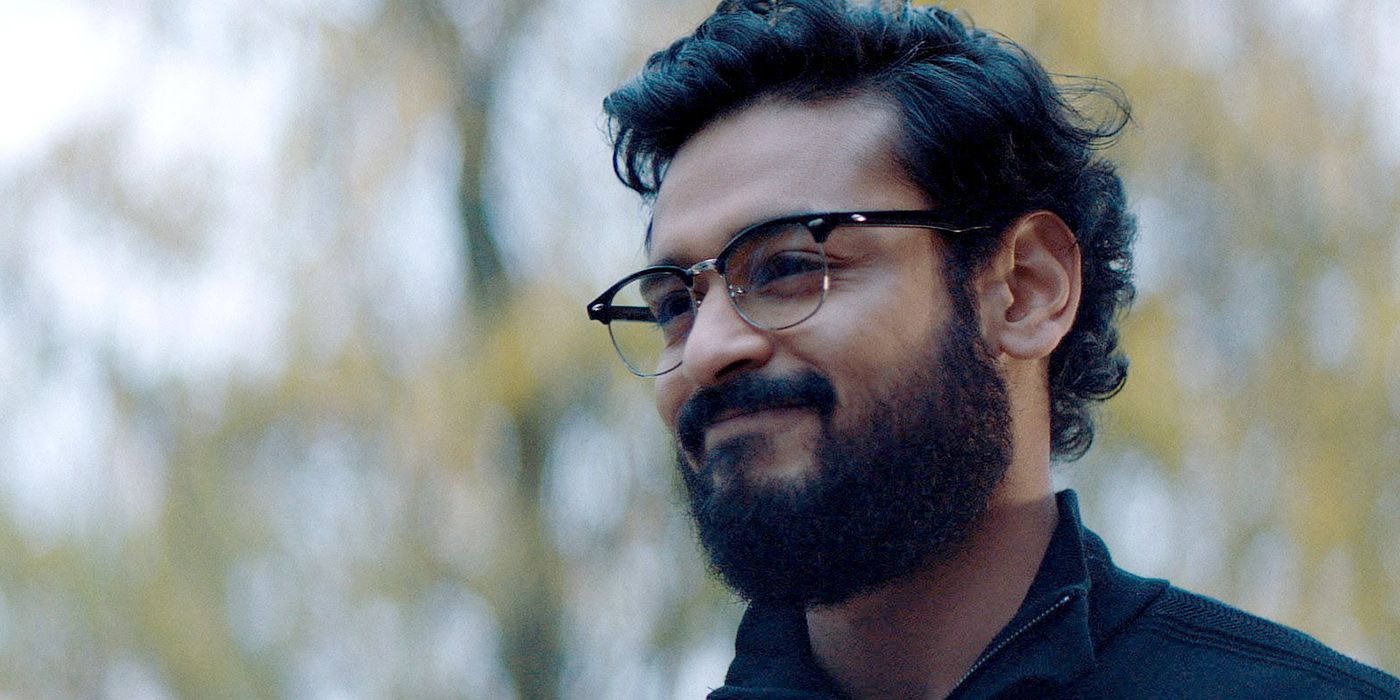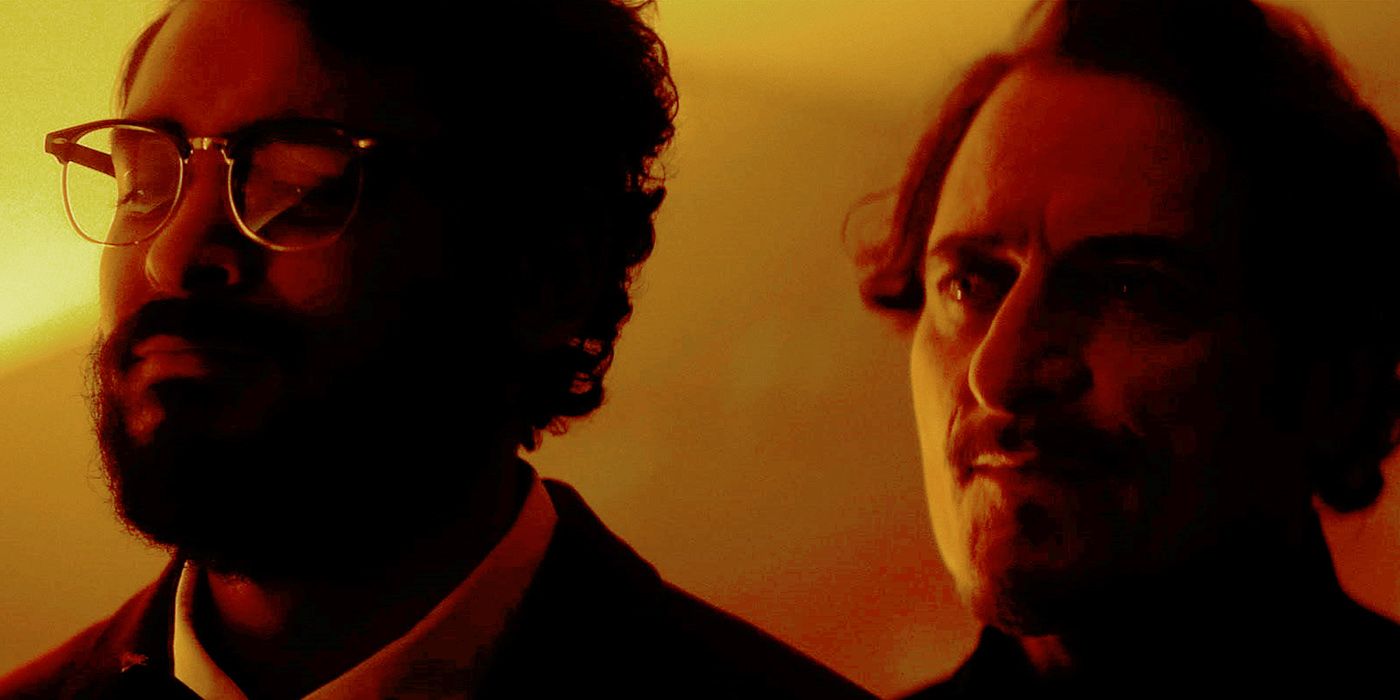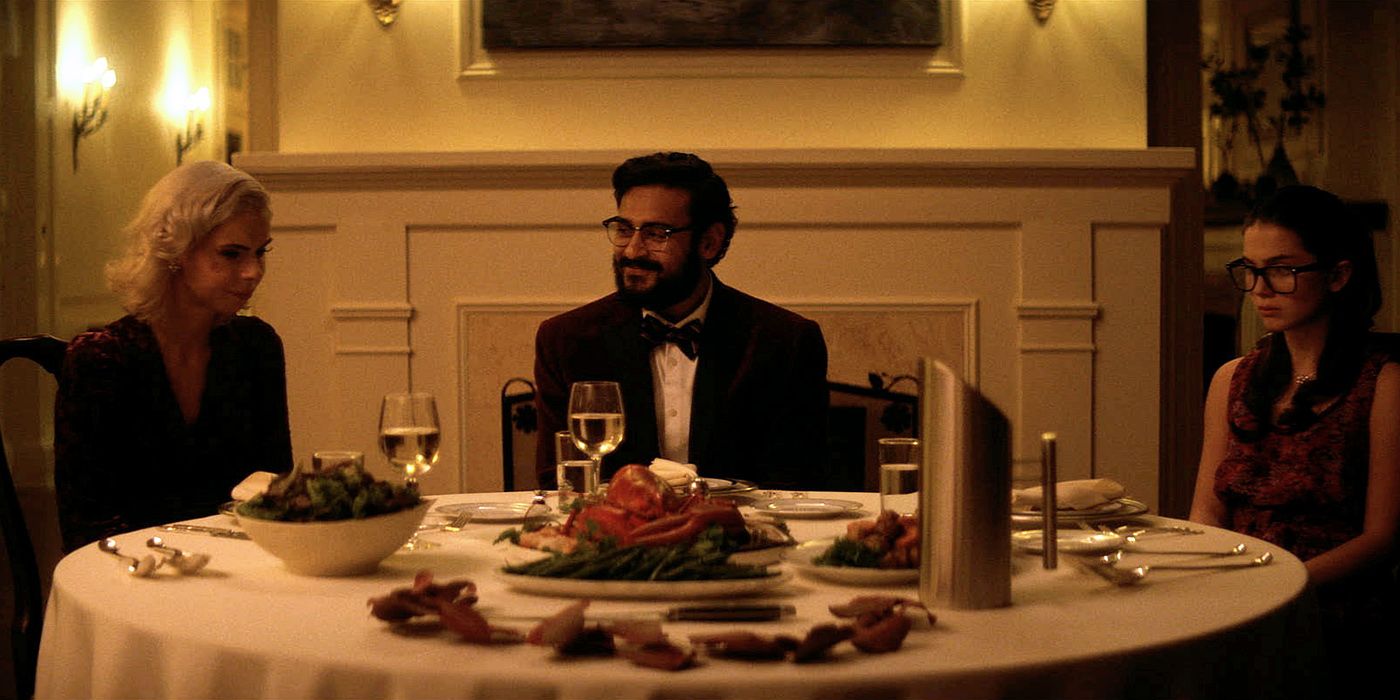Dana Abraham has done what many artists wish they could with Neon Lights, which is write a movie script with a starring role for himself that he truly believes in. His debut feature film, arriving on digital and On Demand July 12, is a psychological thriller that explores family ties and trauma bonds as one man tries to piece his life back together during a strange retreat with his estranged siblings.
Neon Lights is an intimate portrait of a family that has lost its way, using inventive cinematography and only a few different sets to investigate the psychology of Clay Amani (Abraham) and the demons that haunt him. The cast remains small throughout, which adds to the feeling of both intimacy and claustrophobia. Alongside Abraham, the movie stars Brit MacRae, Erika Swayze, René Escobar Jr., Brenna Coates, Stephen Tracey, Lauren Howe, and Kim Coates (Sons of Anarchy) as various members of Clay's family or professional environment.
Screen Rant spoke to Abraham about the many hats he wore throughout the creative process, and the initial inspiration behind Neon Lights and how it shifted through collaboration with director Rouzbeh Heydari and the creative team.
Screen Rant: What first inspired the Neon Lights concept, and how did you and Rouzbeh collaborate on the script?
Dana Abraham: I had met Rouzbeh on a Zoom call in March 2020, and it was actually about editing a previous feature film, Maternal. He reached out to me at a later date, just talking about how we've got to do something else. Like, "I'm a director that got into editing, and I'd really love to make my segue back."
The pandemic hit and everything kind of shut down, but Rouzbeh and I stayed in touch. We talked a lot, pretty much more than I've spoken to anybody. We wanted to make a film, but by focusing on the themes of everything that was encapsulated within the pandemic itself; mental health being at the prevalent forefront of that. The big aspect of this film, when we started putting the pieces together, was to make something that's entertaining, where the audience would be very interested.
We needed something that the investors would jump on board and have an opportunity to get money back, obviously. But at the same time, we wanted to connect to the audience, and to give them something so that they can feel a personal resemblance with Clay and the entire story itself. We really delve into mental health, childhood trauma, financial and familial failure - and we really focus on that while trying to create the twists and turns that keep you in your seats.
Not only did you make a transformation for the film, because you look unrecognizable in it, but you also wore several hats throughout. You wrote, produced, and starred. How do you go between those roles when you're on set, if at all?
Dana Abraham: The one word that always comes to mind is "difficult." I'm really blessed to have the right people around me. Jazz Brar, who produced it with us, and Trevor Smith... We work well together there. They're in every project with me, so when we get to camera, they pretty much take a lot of the weight off my shoulders. And then I really start focusing on the creative end, which is the acting.
The writing with Rouzbeh is almost all accomplished before we even get to camera. A lot of the creative efforts and collaborations we make with the cast are done before we show up on the day, so there's no tweaking when we're in production. Nevertheless, you can't help but edit things out as you move along. I do have so much help when we get to camera, though, that I'm really just focusing on the acting - specifically with Clay, because it was so challenging shift into him. I definitely had to focus extravagantly to make sure that I did the day-to-day job properly.
Speaking of the acting, there are so many rich and painful dynamics between Clay and his siblings that we see play out. What is it like to get into that mindset and play off your fellow actors?
Dana Abraham: It really boiled down to just having such brilliant colleagues across from me. When it came down to casting, because it was such a small pool, we decided we'd do the casting ourselves. We watched thousands of tapes; I think it was 2200 tapes, and now I understand the casting process.
One thing we did really appreciate was just being able to see everybody put themselves on camera and show their personalities. We did Zoom chemistry reads with most of them and, right away, if we had chemistry on Zoom then we figured it's just gonna get ten times better in person.
I got to play off a lot of their behaviors and their sensibilities, and who they thought the characters were for themselves. But the big aspect that I felt we really touched on was all of our relationships with our siblings and our family members. I have three sisters, and I'm very close to all of them; they're all my best friends. But we definitely have our difficult moments, and we really get to touch on that with Clay and bring that to light. I don't think any given relationship is easy, and to build and work through any given relationship - whether it's intimate or familial - you really just have to play off each other. It's never a one-way street, and I think that's what we were able to capture in Neon Lights.
When Clay first gathers his siblings for this retreat, what do you think he is hoping to see happen?
Dana Abraham: It's funny, I was watching a film yesterday about a couple. The husband wanted to go with his wife, because they were having a hard time with the relationship. We feel that, anytime you're at a difficult crossroads, the only way to help heal is by just locking yourselves in the middle of an off-the-grid location saying, "Hey, we're gonna work through this." And it doesn't work out, because it really comes down to just your relationship.
But for Clay, I think what he's hoping for is just to heal. It's to have that moment where he gets to say, "Hey, I just want to work through our problems. I want us to have a nice family dinner, where we can just really talk to each other and figure out what our issues are, and really work past those issues." When you distill Clay right down to a human being, he's just a person that wants to be loved, like every single one of us.
During the pandemic, a lot of us were isolated and a lot of us were in relationships that didn't mean what we thought they had meant. All we really want is just to be loved. I think in acting any given character, they always want just to be loved. I think that's the same premise and foundation where Clay begins his journey.
Your scenes with Kim Coates are incredibly creepy and contain dual roles for both of you. What is the experience of working with him one-on-one, and then having those moments where you're not so alone?
Dana Abraham: Firstly, Kim's just a great professional and a great person. We got to work alongside him pretty early; about eight weeks out, we were talking about notes and his ideas and on wardrobe and makeup and hair. He's really particular, whether you see it or not, he needs to know.
Working with him one-on-one in a scene was beautiful. It's my first lead role in my first feature film, so having somebody of that caliber and experience level - working across from someone who's worked with Kevin Costner, Ron Perlman, Charlie Hunnam - he brings a lot of experience to the set. We really got an opportunity to just be present in the moment and just really work off of each other. We'd make quick little changes on what's working and what's not working.
Then on top of that, he shot the first segment of the filming, and then he was off. He had to go shoot something else, as he's a busy man. I got to really remember what it was like working with him, and we got to really transfer that experience to everybody else. He really set the standard of filming and our modus operandi on the first week that we worked together. The day before he left, he told me it's my show, and just gave me some really good words of advice that I got to carry on with me throughout filming - and then through my career since then.
Working with him is something I'll never forget, and I'll hold it dear to me moving forward.
The title Neon Lights calls a certain image to mind from the beginning. How early on did it have that name, and how did the concept influence the aesthetics of the film?
Dana Abraham: Funny enough, I wrote the first draft in the backseat of a pickup truck with my best friend driving back from New York City. We stumbled into a really small town in the state of New York, and it was just really weird vibe. We went to a carnival, and there was all these neon lights in this carnival. So, I kind of wrote that into the original story.
But Rouzbeh really took it to the next level, because he's a highly intelligent person. He really exudes intellect, and he's very well-read and experienced in the world. When we delve into mental health, all the lights had to mean something. It wasn't just enough to have neon lights, so each light resembled a character and their personality and traits. That's where we really took it.
When creating the story on the second draft, it was just really about, "What do these lights mean to you, Dana? What does it mean for the character? Let's really get particular and specific with it." The specificity of the lights themselves really had to do with the mental capacity and fortitude of the characters within the film and the story.
Now that you've created this film, what is your next step? What are you hoping to dive into next?
Dana Abraham: We just filmed A Hundred Lies last summer with a great ensemble cast. It's about the volatility of Toronto's music industry, and how music is financed in the underground in Toronto. That's releasing later this year as well. We're working on releasing Maternal, which is a psychological thriller as well with Amybeth McNulty and Colm Feore.
And currently, we're doing one more thriller. Just one more, I swear! But it's a Edgar Allan Poe adaptation titled Black Cat. It's a beautiful, contemporary and diverse take on his short story. The film was made in 1937, but it's nowhere related to that. It's about another tech tycoon - and also probably my last time playing a tech tycoon - who really delves into a haunting and possession that's cross-generational. And after that, we were actually hoping to do you Sixth Sense-type film with a company out in LA, so we're staying really busy and we're really excited. It'll be a good time.
Neon Lights Synopsis
Thirty-year-old tech tycoon, Clay Amani (Dana Abraham), is on the verge of a hostile takeover of Tempest Tech, all while he attempts to overcome mental health disorders and childhood traumas. Upon the advice of his therapist Dr. Mori (Brenna Coates), Clay retreats to an off-grid location for a family reunion with his misfit siblings, in order to “face his traumas, head on.” During the reunion, family secrets are revealed that ripple tidal waves through the already strained relationships between Clay and his family.
In hopes of turning this tragic encounter around Clay’s trusted advisor Denver Kane (Kim Coates) attempts to help Clay navigate and come to terms with what’s truly required to get back on track, and focus on what’s truly important, to retake control of his company. But things go very awry, and Clay is left fighting for more than just his company, when guests begin disappearing.
Check out our interviews with Neon Lights stars Kim Coates and Brenna Coates, as well as director Rouzbeh Heydari.
More: 10 Psychological Thrillers To Watch
Neon Lights will be available on digital and On Demand July 12.



